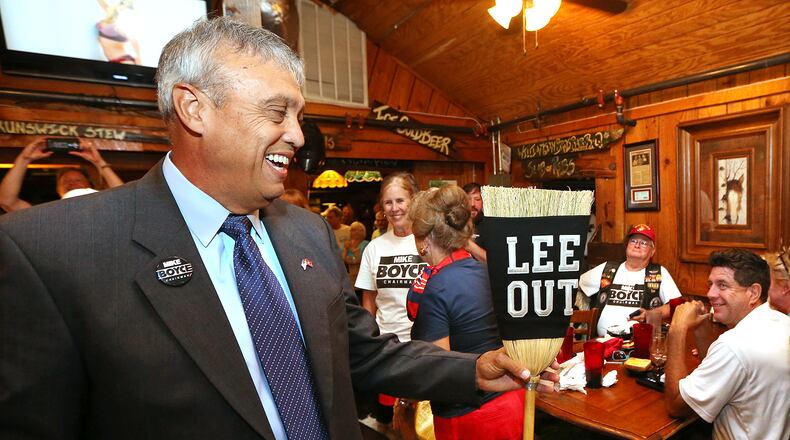In phone calls, at candidate forums and on doorsteps, retired marine Col. Mike Boyce had one question for voters as he campaigned to replace Tim Lee as the Cobb County Commission chairman: If we can vote on a $40 million park bond, why can’t we vote on a $400 million stadium?
That appeal to lingering resentment over way the Atlanta Braves ended up relocating to Cobb County — without public say-so — proved successful.
Voters handed Boyce a resounding victory in the race. But now that he’s won, some are wondering what else he stands for, and whether he can lead the county in confronting other pressing issues, such as public safety, development and transportation.
Brian Robinson, a public affairs communications consultant who worked on Lee’s runoff campaign, lamented that Boyce was able to define the campaign around the Braves deal without addressing other issues.
“One dynamic that the Tim Lee campaign could not break through was that this became a referendum on Tim, and Boyce’s positions or Boyce’s actions were almost irrelevant,” Robinson said. “He was a single issue candidate. … And, in the end, it was a strategy that worked. Talking about anything else would risk alienating the voters mobilized by one issue.”
But Lance Lamberton, who volunteered for Boyce’s campaign and runs the Cobb Taxpayers Association, said establishing transparency was necessary to resolving the county’s entrenched problems.
“Going forward, we want a new environment of transparency and accountability so that we don’t get ambushed like we did in the past,” he said.
Lee supporter Carol Brown of Canton Road Neighbors, a familiar face at commission meetings, was skeptical. Brown said she wants to know Boyce’s vision for the future development of Cobb County, including public transportation and how to strike a balance between the interests of developers and neighborhood associations.
“He was repeatedly asked many relevant questions, and he didn’t really answer them in a clear and concise way,” Brown said. “We never really learned what his positions were on more than just one or two issues.”
Brown also questioned whether Boyce’s military leadership style is well suited to local government.
“I have to wonder whether, because of his military career, he is more comfortable with a very top-down approach to governing and, while he may listen, he’s not going to be quite as inclusive as he could be,” Brown said.
Boyce has declined to take firm positions on the issues cited by Brown and others, opting instead to emphasize his philosophy of transparency and even-handedness.
“In the next five months, I need to sit down and talk to different people in government and outside about those issues,” Boyce said when pressed on his broader platform. “I don’t have any specific program other than my commitment to making public safety the No. 1 priority.”
Boyce also responded to concerns that his military experience may not lend itself to a collaborative, democratic atmosphere. Boyce was a career marine who occupied high-level positions across the Middle East, including Iraq, and worked as a budget specialist for the Pentagon.
“I’m a public servant,” Boyce said. “The Marine Corps might be an institution that had more directive authority, but the bottom line is every government agency still requires people to work with other people to come together for a common solution.”
East Cobb Commissioner Bob Ott, the only commissioner to endorse Boyce, said he has full confidence in the future chairman’s abilities, adding that every newly elected public official faces a learning curve.
“It’s very difficult for somebody who’s not an incumbent to be able to converse about every little topic in the county,” Ott said. “Just because you don’t come out with specific ten points, twelve points, whatever, doesn’t mean that you don’t understand what it takes to run a good government or to be a good leader.”
Ott said Boyce has budgeting experience from his time in the military, and that he understands how vital the success of the Braves project is to the county.
Kerwin Swint, chair of the Department of Political Science and International Affairs at Kennesaw State University, said he would not go as far as to call Boyce a “one-issue candidate.”
“They definitely took advantage of the dominant issue, which is understandable. It’s what was on everyone’s mind and what was the most recent high profile issue,” Swint said. “Boyce’s larger issue though, his larger campaign, is about transparency in general. He really hammered that home.”
Swint noted that, while the Braves deal was the dominant issue in the race, there were others that worked against Lee.
“It’s also part of a larger pattern, a larger disagreement that Lee has had with some voters in Cobb County over transportation and economic development issues,” Swint said, pointing to Lee’s support for a controversial bus rapid transit system. “He definitely could have been better at interpersonal relations. I do think that some of his vulnerabilities have to do with personal style and approach and not necessarily policy.”
Swint said Boyce had to walk a fine line in criticizing the handling of the Braves deal without disparaging the Braves in a way that would damage his or the county’s relationship with the team.
“I think there’s going to be a lot of talk of, ‘We need move forward; he needs to make it work,’” Swint said.
About the Author
Keep Reading
The Latest
Featured




